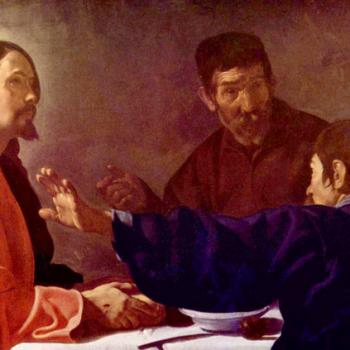Scrambling the Evangelical Egg
On Saturday I laid out some thoughts about being a progressive evangelical. Over the past week or so I have been working through some of my reading backlog by going through Phyllis Tickle’s The Great Emergence.
The book is reminding me that my own journey toward what seems to some to be a scrambled identity did not happen in a vacuum. The information age we’re in has propelled a seismic shift that has scrambled people’s alignments: evangelicals adore the liturgy, Catholics speak in tongues, mainliners read the Bible through the old lenses of the creeds.
My progressive evangelicalism is a scrambling of what used to be true of just conservatives with what used to be true of just mainliners. And a crucial component in my journey away from being a conservative evangelical was when I gave up on faith.
Ok, I didn’t give up on faith entirely. But I started to understand differently what saving faith looks like. In short, it comes down to this: thinking the right things does not save anyone.
“Thinking the right thing” is my interpretation of “believing the right thing.” Because in practice, they are equivalent. And the dangerous posture that has taken deep root in Protestantism is that the wholesale systems of belief we have constructed are the things that demand our allegiance if we are to find ultimate favor with God.
From Faith to Faithfulness
In my personal narrative, the first move away from faith was to “faithfulness.”
What I have to say next might come as a shock to some people, so if you’re standing and reading this on an iPhone or something, have a seat. I don’t want anyone getting hurt.
The one who led me from “faith” to “faithfulness” was Paul. What is it that saves us, in Paul’s estimation?
Yes, of course there is our response to the gospel message. But this is not, ultimately, what saves us. The saving work is Jesus’ death and resurrection. And when Paul talks about saving faith, it’s Jesus’ saving faithfulness that takes pride of place:
However, we know that a person isn’t made righteous by the works of the Law but rather through the faithfulness of Jesus Christ. We ourselves believed in Christ Jesus so that we could be made righteous by the faithfulness of Christ and not by the works of the Law—because no one will be made righteous by the works of the Law. (Galatians 2:16, CEB)
One of the most important dynamics of the biblical story that they hammer into your head in seminary is that “indicative” precedes “imperative.” That is to say, what God does for us always comes before what God asks of us.
But it’s more specific than this. The indicative not only precedes, it also sets the trajectory for the content of what is to follow. It becomes the narrative that people expect to see repeated.
The saving story of the cross writes the script for subsequent generations of disciples: “take up your cross and follow me.”
In Paul’s letters it is no different. Paul does not write to the churches about the death and resurrection of Jesus in order to get them to think the right things. He writes these letters to get them to be faithful to the God and Father of Jesus in the same way that Jesus himself was: a crucifixion of the flesh with its passions and desires, laying down their lives so that the people around them might find life.
When Paul expresses the goal of his discipleship, he says that it is to bring about, not faith [full stop], but “the obedience of faith” (Rom 1:5). Christ saved by faithfulness, and we are called to a lifelong fidelity to God.
From Faith to Trust
The sharper image that has developed over the past several years has been to move from thinking of “faith” as “belief” to thinking of faith as “trust.”
The impetus for this particular rendering of our Christian vocation came from Romans 3. There, Paul is starting to get into the weeds a bit about the implications of Israel’s failure to respond to Jesus as Messiah. Here Paul plays with the Greek word pistis. We typically translate this “faith,” but it won’t quite work here. Take a look:
First, they were entrusted (episteuthesan) with the oracles of God. What then? If some of them failed in their trust (episteusan, or “were faithless”) their failure of trust (apistia, “faithlessness“) will not nullify God’s trustworthiness (pistis, “faithfulness”), will it?
The question Paul is wrestling with here is, Can God be trusted? Is God trustworthy? Alternatively, we might see this as, Is God faithful?
God’s own mission in the Gospel is to find a people whose willingness to entrust themselves to God matches God’s willing to entrust himself to them.
(I know that this is true because at the end of that last sentence my word count was 777.)
From Reformed to Reforming
The Reformation was built on “justification by faith alone” as one of its key rallying cries.
I’ve always had an ambivalent relationship with the Reformation. I have been more committed to its mode of theologizing than its theological results. Give me the Bible and Jesus and my brain and my understanding of history and my community. But don’t think I’ll “honor” the Reformers by saying what they said, thereby setting them up as the very sorts of ecclesiastical authorities they worked so hard to throw off.
In fact, what I have found is that the dangerous game of defining ourselves by “thinking the right things about God,” a temptation that has haunted the church almost from its inception, has been deadly (literally and figuratively) across the centuries. It is the mistaken understanding of the gospel that leads to such lethal mistakes as the Wheaton College Larycia Hawkins fiasco.
Going back to the Paul whose writings sowed the seed for “faith alone,” I have discovered that the heart of the human response to the message of Jesus is not believing that it happened, but entrusting ourselves to that story, to that God, to that God’s way of saving, to that savior’s way of being fully human.
So when I stand up on Sunday mornings and recite the Creeds, I do a little translation in my head. While everyone else is saying, “I believe…” I am saying by my words, “I entrust myself to God the Father Almighty… and to Jesus Christ his only Son our Lord… I entrust myself to the Holy Spirit…”
Because, in the end, thinking the right things is not what God is after.












